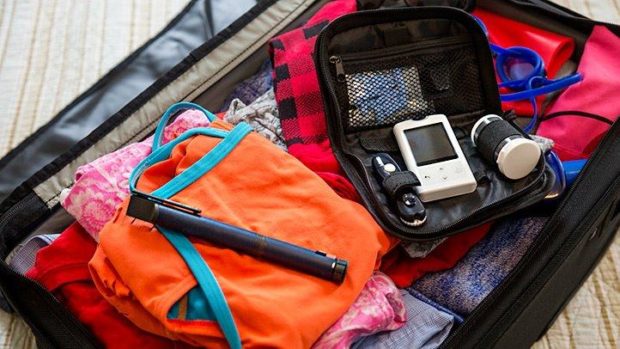With winter approaching, many people are planning their holiday vacations, booking flights to far-flung places, visiting relatives and escaping the cold. If you have diabetes, you might feel some trepidation about international travel, as it can be tricky to maintain your routine. The change in time zone throws off your timing, the foreign foods can interfere with your diet, and the constant walking can be painful for your feet.
But diabetes shouldn’t stop you from globetrotting. With some simple pre-planning, a consultation with your licensed chiropodist and a good pair of shoes, you can travel with ease this winter. Here are four tips for making the most out of your upcoming vacation.

Make A Medical Checklist
When you consult with your doctor, work together to create a checklist. This might include types and amounts of medication; a first aid kit; snacks and sugar for times when a restaurant or shop might be inaccessible (as on a hike, for instance); and a medical alert bracelet. Once again, it’s important to stress that, unless traveling with diabetes is old hat for you, this checklist should be made with the help of a medical professional.

Keep Your Feet Comfortable
With diabetes, foot pain is a common complication, and it can certainly be exacerbated by the physical demands of traveling. When traveling, invariably you will spend more time on your feet, so make sure you pack proper footwear. Consult with a professional foot clinic like Feet First Clinic to get the right orthopedic footwear for your feet, as well as removable insoles and a reinforcing heel counter.

When Crossing Time Zones, Make A Medication Schedule
Whether with a doctor or diabetes educator, plan your meal and medication schedule according to the time zone changes you will be making. Your travel day will be longer when heading west and shorter when heading east, meaning you may have to adjust the units of medication you require. Whatever the case, it’s wise to set an alarm on your phone to remind you when meals, insulin and medications are scheduled, as travel can be disorienting.
Learn Some Key Phrases
Should you find yourself in a tough situation, one that requires you to communicate your condition or ask for certain things, you want to be able to express yourself. Committing a few key phrases to memory, like “I have diabetes”, “where is the closest hospital”, etc., is a great idea. Alternately, it is just as effective to carry a phrasebook, provided it stays on your person at all times. This thread, from the Global Diabetes Community forum is a helpful place to start learning phrases – users have offered translations of key phrases into some common languages.
